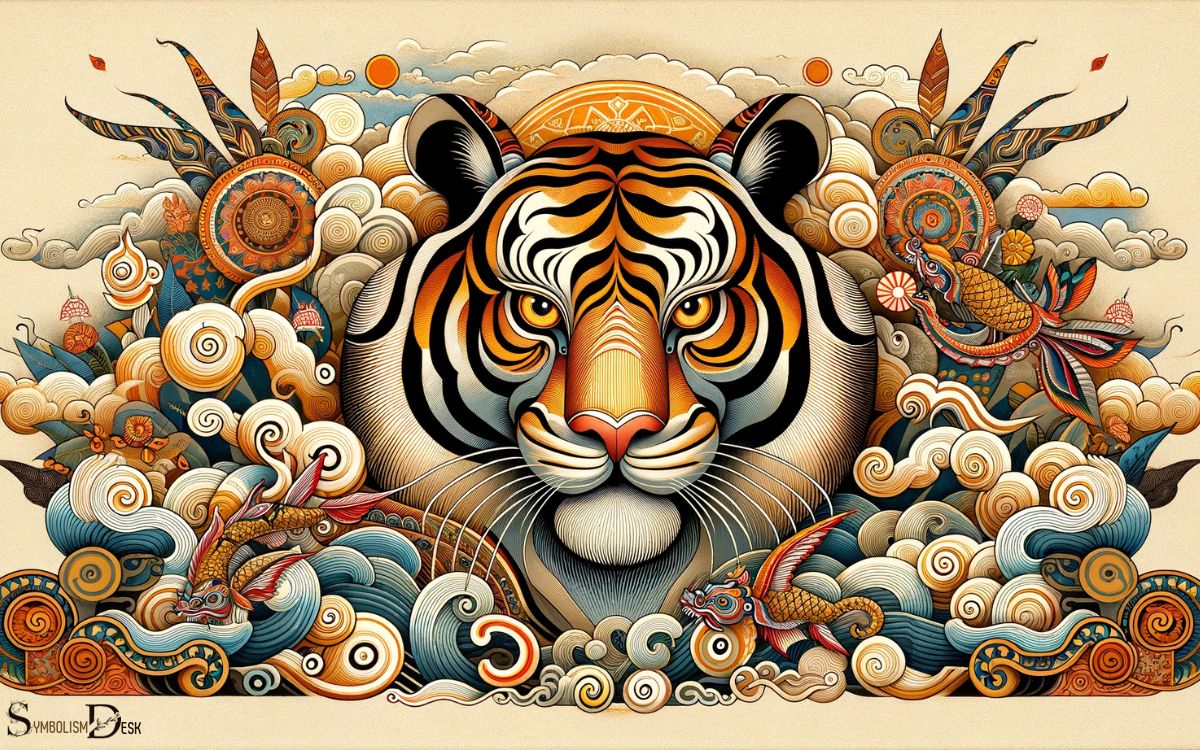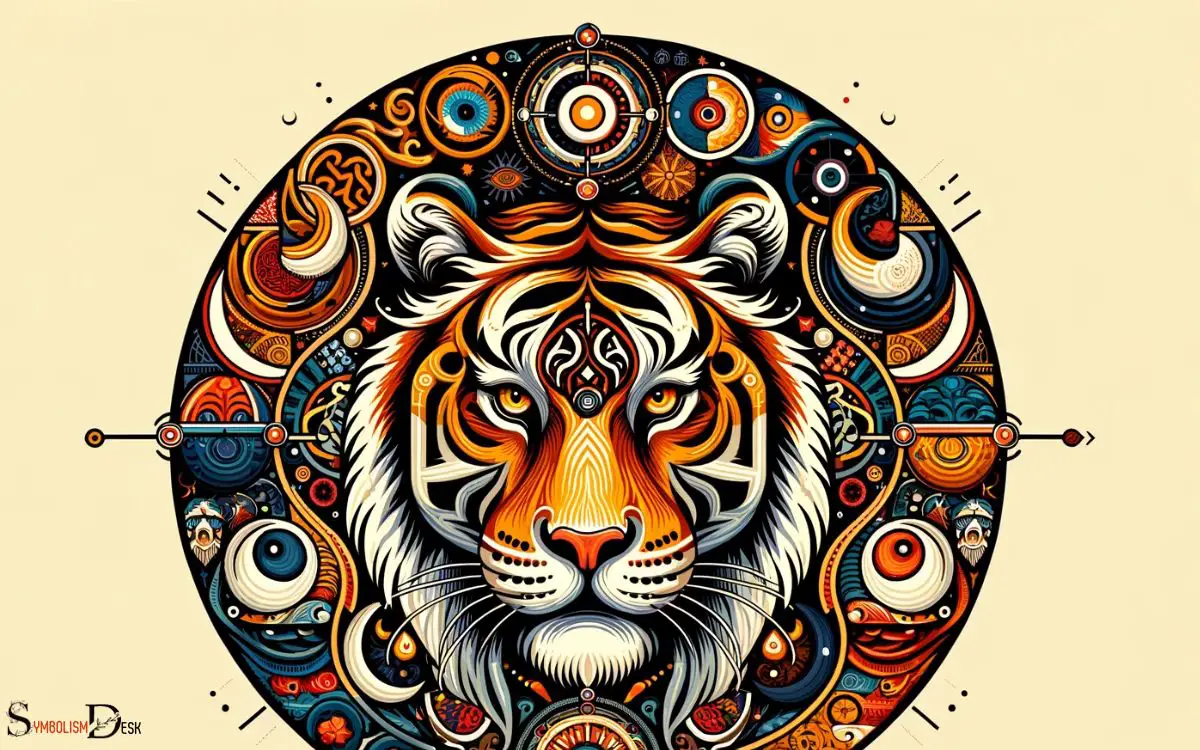What Does a Tiger Symbolize Spiritually? Power!
The tiger symbolizes a range of spiritual meanings including power, courage, protection, and unpredictability. It is often considered a spirit animal that represents personal strength and the ability to overcome obstacles and fears.
Spiritually, the tiger is a powerful totem animal that embodies various qualities:
For example, in Hinduism, the goddess Durga is often depicted riding a tiger, symbolizing her power and protection.
Embracing the tiger’s spirit can inspire individuals to tap into their inner strength and face life’s adversities with fearlessness and poise.
The spiritual essence of the tiger encompasses power, bravery, guardianship, and unpredictability.
Historically and culturally, the tiger is an eminent emblem in both Eastern and Western traditions, exemplifying various spiritual qualities.

Key Takeaway
Historical and Cultural Significance

The tiger holds significant historical and cultural significance in various Eastern and Southeast Asian societies. Throughout history, the tiger has been revered as a symbol of power, strength, and protection.
In many Eastern cultures, the tiger is associated with qualities such as courage, bravery, and ferocity, making it a revered symbol in their traditions.
Moreover, the tiger has often been depicted in various art forms, literature, and folklore, further emphasizing its importance in these societies. Its presence in mythology and spiritual beliefs has solidified its significance as a symbol of resilience and prowess.
The tiger’s representation in Eastern and Southeast Asian societies has had a profound impact on shaping their cultural identity and values.
This historical and cultural significance lays the foundation for understanding the deep symbolism of tigers in Eastern traditions.
Tiger Symbolism in Eastern Traditions

Having established its historical and cultural significance, the symbolism of the tiger in Eastern traditions embodies qualities of courage, strength, and resilience. In Eastern cultures, the tiger is often revered as a symbol of power, protection, and bravery.
In Chinese tradition, the tiger represents the king of all beasts and is a symbol of the highest yang energy, associated with the direction west and the element of metal.
It is also one of the 12 Chinese zodiac animals, embodying characteristics such as competitiveness, bravery, and unpredictability.
In Hindu mythology, the goddess Durga is often depicted riding a tiger, symbolizing the divine feminine power and the ability to harness and control one’s inner strength.
The tiger’s presence in Eastern symbolism serves as a reminder of the indomitable spirit and the ability to overcome adversity.
Tiger Symbolism in Western Traditions

Tiger symbolism in Western traditions often revolves around the themes of strength in adversity, power, and courage.
These symbols are prominently featured in Western literature, art, and folklore, where the tiger is often depicted as a formidable and noble creature.
The representation of these qualities in Western traditions reflects the universal admiration for the tiger’s attributes and the enduring impact of its symbolism.
Strength in Adversity
Symbolizing resilience and courage, the tiger’s representation in Western traditions emphasizes strength in adversity.
In Western cultures, the tiger is often seen as a symbol of overcoming challenges and standing strong in the face of adversity.
The tiger’s ability to thrive in difficult environments has made it a powerful symbol of resilience and determination.
This symbolism is often used to inspire individuals to persevere through hardships and remain steadfast in their pursuits.
The tiger’s strength in adversity is a reminder that even in the most challenging circumstances, one can find the inner strength to endure and triumph.
This symbolism has been embraced in Western literature, art, and even sports, where the image of the tiger is often used to evoke a sense of courage and fortitude.
Power and Courage
The tiger’s representation in Western traditions emphasizes the power and courage of the animal, reflecting its ability to thrive in difficult environments and symbolizing resilience and determination.
- Tigers are seen as symbols of strength and bravery, often depicted as noble and fearless creatures in Western literature and art.
- The tiger’s ferocity and fearlessness in hunting prey have made it a symbol of courage and power in Western cultures.
- The tiger’s solitary nature and ability to navigate diverse terrains have led to its association with independence and adaptability, traits highly valued in Western societies.
- The tiger’s presence in Western mythology and folklore often signifies the triumph of bravery and determination over adversity, serving as an inspiration for individuals facing challenges.
The Spiritual Meaning of Tiger Characteristics

Spiritually, the characteristics of a tiger convey strength, courage, and assertiveness. Tigers are revered for their physical prowess and fearlessness, which symbolize the inner strength and bravery required to overcome life’s challenges.
The tiger’s solitary nature also represents independence and self-reliance on a spiritual level. Its keen senses and agility denote the importance of being aware and adaptable in the spiritual journey.
Furthermore, the tiger’s focused and determined hunting style reflects the need for a clear vision and unwavering determination in the pursuit of spiritual growth.
Tiger as a Spiritual Guide and Totem

The tiger holds significant spiritual significance as a guide and totem. It embodies strength, power, courage, and bravery.
Its representation in spirituality is often associated with the connection to intuition. The tiger is a revered symbol for those seeking guidance and protection on their spiritual journey.
Understanding the deeper spiritual meanings behind the tiger as a guide and totem can provide valuable insights into one’s own inner strength and resilience.
Strength and Power Symbolism
Tigers embody a formidable representation of strength and power in spiritual symbolism. In many spiritual traditions, the tiger is revered for its association with strength and power, serving as a spiritual guide and totem for those seeking these qualities.
The strength and power symbolism of the tiger as a spiritual guide and totem can be understood in the following ways:
- Leadership: Tigers symbolize strong leadership and the ability to take charge in various aspects of life.
- Courage: They represent the courage to face challenges and the strength to overcome obstacles.
- Protection: Tigers are seen as protectors, providing a sense of security and safety in the spiritual realm.
- Personal Power: They embody personal power and the ability to harness one’s inner strength for personal growth and transformation.
Courage and Bravery Representation
Courage and bravery are exemplified by the tiger as a spiritual guide and totem, embodying the essence of fearlessness and valor in various cultural and religious contexts.
In many spiritual traditions, the tiger is revered as a symbol of courage, strength, and protection. As a spiritual guide, the tiger encourages individuals to tap into their inner reservoirs of bravery and confront challenges with confidence.
It serves as a reminder to stand firm in the face of adversity and to approach life with boldness and resilience.
As a totem animal, the tiger inspires individuals to embrace their personal power and to act with courage in pursuit of their goals.
By embodying the spirit of the tiger, one can draw upon its enduring bravery and find the strength to navigate life’s obstacles with unwavering determination.
Connection to Intuition
Embodying intuition, the tiger serves as a spiritual guide and totem, leading individuals to trust their inner wisdom and instinctual knowledge.
The tiger’s connection to intuition is profound, offering spiritual guidance in various aspects of life:
- Encouraging individuals to listen to their inner voice and gut feelings
- Helping to navigate through uncertainty and trust in one’s instincts
- Signifying the importance of being aware of one’s surroundings and the energies present
- Guiding individuals to embrace the power of silence and observation in gaining deeper insights
By embracing the tiger as a spiritual guide and totem, individuals can learn to connect with their intuition and trust the wisdom that resides within.
This profound connection to intuition can also manifest in dreams and visions, further deepening the spiritual significance of the tiger.
Tiger Symbolism in Dreams and Visions

The appearance of tigers in dreams and visions often carries profound spiritual significance. In various cultures, the tiger is seen as a symbol of power, strength, and courage.
When a tiger appears in a dream, it may represent the potential for overcoming obstacles and challenges. It can also signify the awakening of personal power and the need to trust one’s instincts.
Additionally, the presence of a tiger in a vision may indicate the need to embrace assertiveness and confidence in facing life’s circumstances.
Some spiritual interpretations suggest that encountering a tiger in dreams or visions is a call to delve into the hidden or unconscious aspects of the self.
How Do Spiritual Symbolisms of Wolves and Tigers Differ in Their Meanings?
The wolf symbolism spiritually freedom represents independence and the ability to make your own choices. On the other hand, tiger symbolism is associated with power, strength, and courage. While both animals are seen as symbols of spiritual significance, the wolf represents freedom, while the tiger embodies strength and bravery.
Interpreting Tiger Symbolism in Modern Life

One significant aspect of interpreting tiger symbolism in modern life is its association with leadership and authority.
Tigers are revered for their strength, fearlessness, and commanding presence, making them a symbol of power and influence in various cultures.
In modern society, tiger symbolism is often used to represent the following:
- Courage and Determination: Tigers embody the spirit of courage and determination, inspiring individuals to face challenges with resilience.
- Protection and Security: The tiger’s role as a protector signifies the need for safeguarding oneself and others from harm.
- Ambition and Confidence: The tiger’s bold and assertive nature symbolizes ambition and confidence, encouraging individuals to pursue their goals fearlessly.
- Respect for Nature: Tiger symbolism serves as a reminder of the importance of preserving and respecting the natural world, promoting environmental awareness and conservation efforts.
Conclusion
The spiritual symbolism of the tiger is deeply rooted in historical and cultural traditions, both in Eastern and Western cultures.
The tiger represents power, strength, courage, and protection, making it a revered symbol in various spiritual practices.
Its characteristics and behavior serve as a guide and totem for those seeking inner strength and wisdom.
The tiger’s presence in dreams and visions further emphasizes its significance as a spiritual symbol in modern life.






